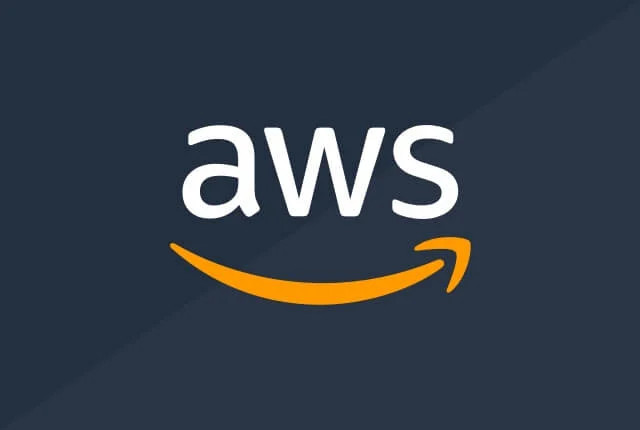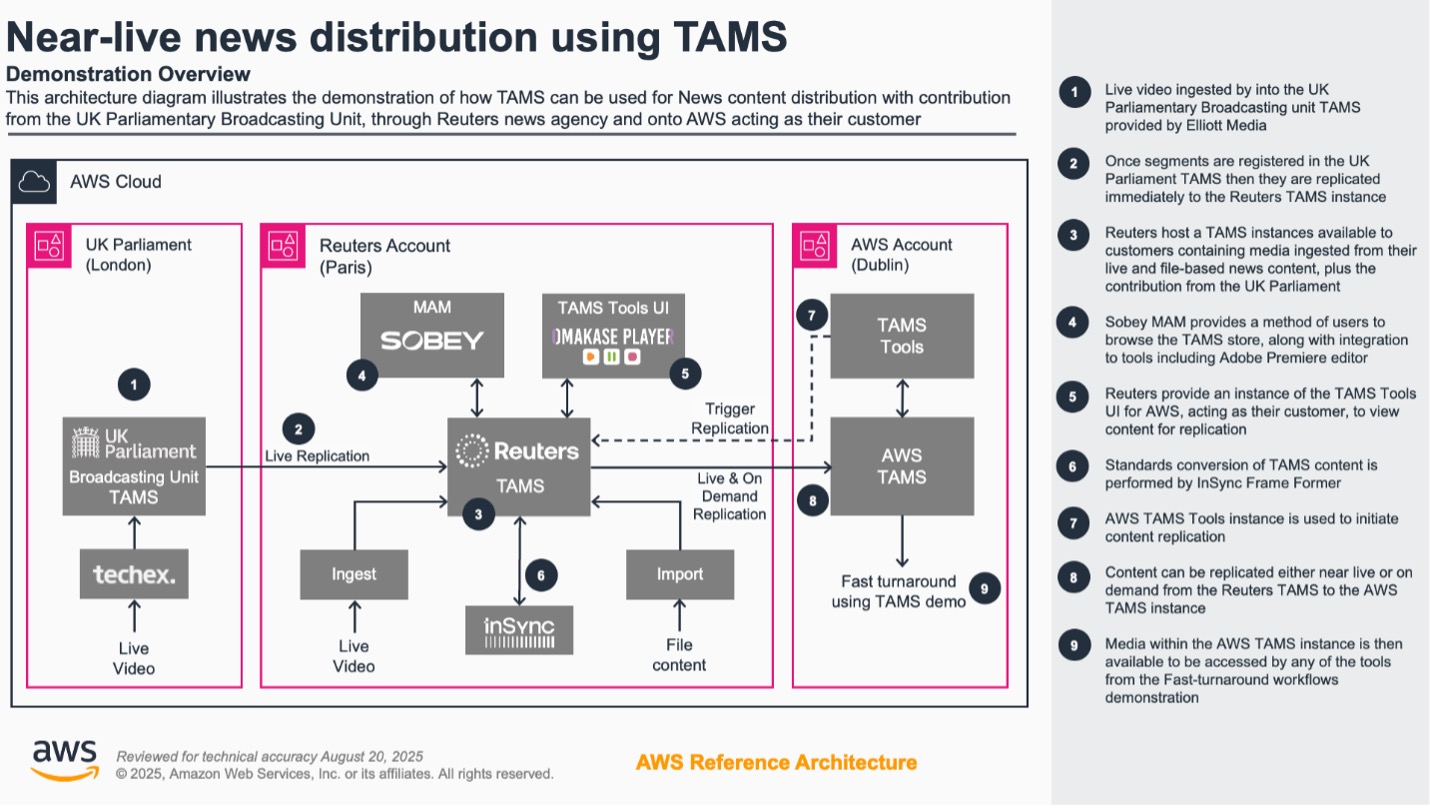Reuters and AWS to Demo News Distribution System at IBC2025
The demo will feature live content captured from the floor of the UK Parliament that is replicated in near real-time to multiple news organizations simultaneously

As news organizations and broadcasters face more pressure than ever to capture, verify, and distribute real-time access to breaking news, Reuters and Amazon Web Services (AWS) have announced that they will demonstrate what they are calling a next-generation news distribution system during IBC2025.
The demo involves live content captured from the floor of the United Kingdom (UK) Parliament that is replicated in near real-time to multiple news organizations simultaneously, the two companies said.
Using the open-source Time-Addressable Media Store (TAMS) API specification and AWS services including Amazon S3, AWS Elemental MediaConvert, and AWS Step Functions, Reuters and AWS will showcase how cloud-native collaboration and interoperability can significantly reduce of the time need to share content, lower associated costs, and transform the way news is created, exchanged and monetized. Additionally, AWS will show how TAMS can be integrated with Amazon Bedrock and TwelveLabs video understanding models to enable embedding of news content.
In a live demonstration, Reuters will ingest UK Parliament feeds produced by the Parliamentary Broadcasting Unit, transmitted using TAMS to AWS, and then provide the content near instantly to broadcasting and distribution partners.
“Speed, accuracy, and trust are the pillars of Reuters visual journalism. By working with AWS, we’re turning camera-to-cloud from a concept into a working reality—moving high-quality footage from the field to our producers and customers in seconds,” Mahesh Ramachandran, head of technology, Reuters. “This isn’t just faster; it’s a fundamental shift in how we gather, edit and distribute video. With AWS’s TAMS-based cloud architecture, Reuters producers and Reuters News Agency customers can instantly access breaking news content, getting verified visuals to audiences sooner, at lower cost and with the flexibility to scale for any story, anywhere.”
“Our cost modeling suggests that TAMS can significantly reduce fast-turnaround workflow costs for organizations like Reuters, on top of time savings,” shared Chris Swan, principal solutions architect for content production at AWS. “Since content in these frameworks is moving between Amazon Simple Storage Service (Amazon S3) buckets in short segments, transfers can be done in parallel instead of linear. What took two hours can be done in seconds, and metadata updates happen instantly.”
Spearheaded by the BBC Research and Development (R&D) team, TAMS is based on the idea of storing short segments of media in an object storage service like Amazon S3, with an API to describe the segments and how they are inter-related, AWS explained.
The professional video industry's #1 source for news, trends and product and tech information. Sign up below.
AWS noted that TAMS solves the challenges of taking a lift-and-shift approach to running fast-turnaround media workflows in the cloud. Adoption of TAMS means shifting away from file-based workflows that lead to content duplication and are difficult to scale. Using timing and identity as key primitives to describe media in the store allows organizations to build more content-centric workflows.
The solution is also designed to address the fact that when news agencies and broadcasters cover the same big story, they must deploy separate teams and resources. With unified interoperability on TAMS, one reputable organization can be the source of truth for content, increasing efficiency and freeing time and resources for elements that differentiate programming.
The open-source standard can be quickly adopted, with the API-driven functionality shaving weeks if not months off development timelines. It also helps reinforce audience trust and expands reach through broader, faster distribution of verified video content and reliable information. The real-time demonstration from Reuters and AWS marks a significant step forward for practical TAMS applications, which are quickly gaining traction in the broadcast industry, AWS explained.
“With TAMS, broadcasters can make more content available to end users faster, using the same internal resources,” added John Biltcliffe, Senior Solutions Architect at AWS. “TAMS can also help revolutionize the viewing experience by supporting self-serve features and deeper personalization, while making it more intuitive for media organizations to use AI for richer audience experiences.”
TAMS was first implemented by AWS for a fast-turnaround workflow at IBC 2024 as a proof-of-concept supported by the Cloud Native Agile Production (CNAP) project. CNAP is a collaboration between companies (including BBC, Sky, Adobe, Cutting Room, Drastic Technologies, Techex, and Vizrt) to advance the development and adoption of the TAMS open-source framework.
After experiencing the demonstration at IBC 2024, Reuters decided to test out TAMS with its own implementation for real-time intercompany distribution.
Reuters and AWS began collaborating in February 2025, and then enlisted BBC, CNN, Sky, and Elliott Media. The resulting setup enables Reuters to make content available almost instantly to any broadcast or distribution partner.
“News broadcasters record everything just in case, and much of this content will be discarded,” explained Swan. “There will still be a need for live contribution for certain events, but using a TAMS approach with the cloud is much more efficient. Reuters records once, then its broadcast partners can access what they need after the event. Moving this workflow to the cloud also enables Reuters to produce more, or less, content as the news cycle dictates. It brings true flexibility and scalability to fast-turnaround workflows.”
The demonstration will leverage TAMS to store, query and access segmented media over HTTP.
Working closely with the BBC, AWS teams built an interoperable framework that provides a single virtual store for live content. This makes it faster and seamless for creators to craft video highlights clips and packages for integration into live content, social sharing and other applications using their preferred toolsets and the AWS Cloud. Visitors to the AWS stand will be able to see a complete, fast-turnaround media workflow spanning low-latency video ingest through to playout—with file import and export, and web-based editing, AWS reported.
For the demo, live video feeds from UK Parliament, Reuters live feeds and Reuters produced short-form video on-demand (VOD) content will be ingested directly into the Reuters TAMS store. From there, content is instantly and securely federated with an AWS TAMS instance, acting as a customer of the Reuters store.
The demonstration also features AWS Partners Mimir, Adobe, Techex, Matrox, and CuttingRoom. The TAMS on AWS implementation is also integrated with video understanding models from TwelveLabs, in Amazon Bedrock, to create embeddings of news content in real time.
“TAMS is foundational for helping the broadcast industry advance AI understanding for live video,” noted Biltcliffe. “It brings all the pieces together by providing the customer with one ingest for all purposes, whether for social media, content production, archive or syndication.”
On Sunday at 12:45 PM in the AWS IBC Showcase Theatre, Reuters, BBC, Sky, and CNN will be speaking on a panel. AWS said that session attendees can hear from technology leaders about:
- Challenges the TAMS approach solves for their organization
- How they are collaborating with AWS to redefine news workflows
- What new opportunities are being unlocked by adopting a cloud-native, open and interoperable approach
Organizations looking to learn more about the CNAP initiative and TAMS, can find additional resources by reading Guidance for Cloud-Native Fast-Turnaround Media Workflows on AWS. Included are a detailed implementation guide, reference architectures, sample code for use in TAMS workflows, and related content.
Attendees can get more information at the AWS IBC Booth (Hall 5, Stand C90). They can also schedule time with AWS at IBC2025.
George Winslow is the senior content producer for TV Tech. He has written about the television, media and technology industries for nearly 30 years for such publications as Broadcasting & Cable, Multichannel News and TV Tech. Over the years, he has edited a number of magazines, including Multichannel News International and World Screen, and moderated panels at such major industry events as NAB and MIP TV. He has published two books and dozens of encyclopedia articles on such subjects as the media, New York City history and economics.


